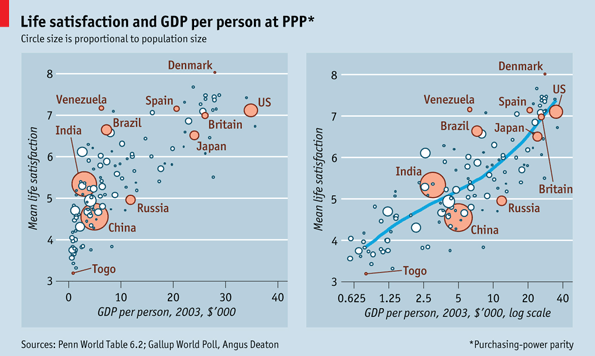
SETH BERTOLUCCI – OCTOBER 31, 2018
The end goal of any social science is, really, to make everyone happy. Whether through psychological counseling or financial planning, social scientists operate under the implicit assumption that the human condition can be improved if we can just discover what’s wrong in the first place. Economics, more than any other field, traditionally assumes variables like a high GDP per capita, a long life expectancy, or a low unemployment rate are the keys to human contentment. As a dedicated economics nerd, I too am guilty of placing these holy metrics above all else. But the data on human happiness seem to tell a more complicated story…
Starting in 2012, the United Nations began compiling the “World Happiness Report” which examines how citizens worldwide rank their subjective level of happiness. Some of the world’s happiest countries have high GDP per capita, and most of the least happy are very poor. But the correlation is far from perfect. Finland, 2018’s happiest country on earth, has a per capita income of $49,000. The USA, clocking in at a dismal 18th place on the report, has 25% more annual output per person than Finland. Clearly, wealth and happiness seem to go together, but perhaps how that wealth gets spent is the important factor here.
According to regression estimates of the data compiled by the UN, a 1% change in GDP per capita will cause only a 0.3 unit change in happiness (happiness is calculated on a scale from 0 to 10). However, when GDP per capita is included with other variables the model explains nearly 75% of the variance in happiness. These other variables consist of social support, life expectancy, freedom to make life choices, generosity, and freedom from corruption. This demonstrates that quality of life, and not just material wealth, plays a huge role in happiness. Alternate variables seem to matter–a lot.
While per capita output is indeed correlated with these other variables (wealthier countries can provide more social services, for example), the differences in factors other than GDP seem to explain much of the variance in happiness for countries at the top of the list. Just increasing GDP without changing how GDP gets spent provides rapidly diminishing returns to human contentment.
Take, for example, Costa Rica. The UN honored them as the 13th happiest country in the world. Yet GDP per capita only explains 14.1% of the nation’s overall happiness score, whereas social support explains substantially more, about 20% of the score. The United States, on the other hand, explains 19% of its happiness score with per capita income, and is ranked 5 spots below Costa Rica. Statistically speaking, Costa Ricans “use” substantially less GDP to generate a level of happiness greater than what Americans generate with far more GDP.
Increasing things like social support or lowering perceptions of corruption can have substantial effects on happiness. Whether that be through amending election laws or strengthening access to healthcare for lower-income Americans, factors outside of economic output need to be considered. If the ultimate end goal of economics really is human happiness, then just boosting output per person might cause us to fall painfully short .
Featured Image Source: The Economist
Disclaimer: The views published in this journal are those of the individual authors or speakers and do not necessarily reflect the position or policy of The Berkeley Economic Review staff, the Undergraduate Economics Association, the UC Berkeley Economics Department and faculty, or the University of California at Berkeley in general.



I believe this article will be worth attention. Today, it is so difficult
to get something useful on the internet, that
I am really surprised to be able to reach this blog. The particular same
happened in my experience when I found https://stoffwechsel03.ch/. I consider the
authors are usually quite similar when it comes to style.
They are usually both damn great. Thanks a lot, keep writing!